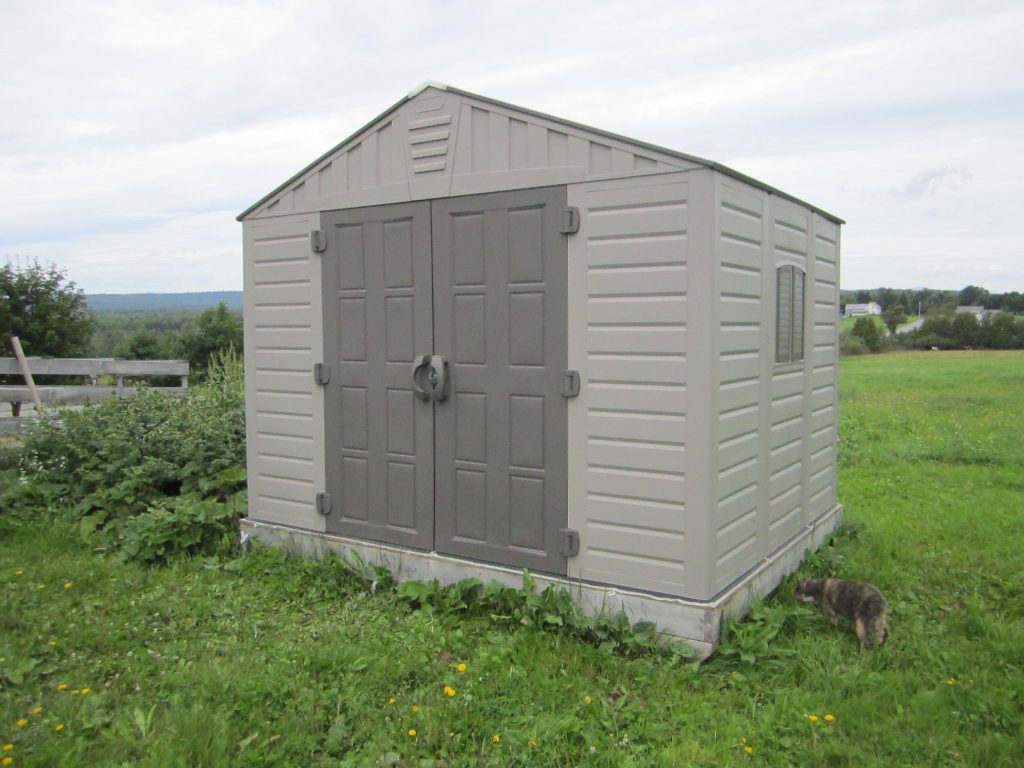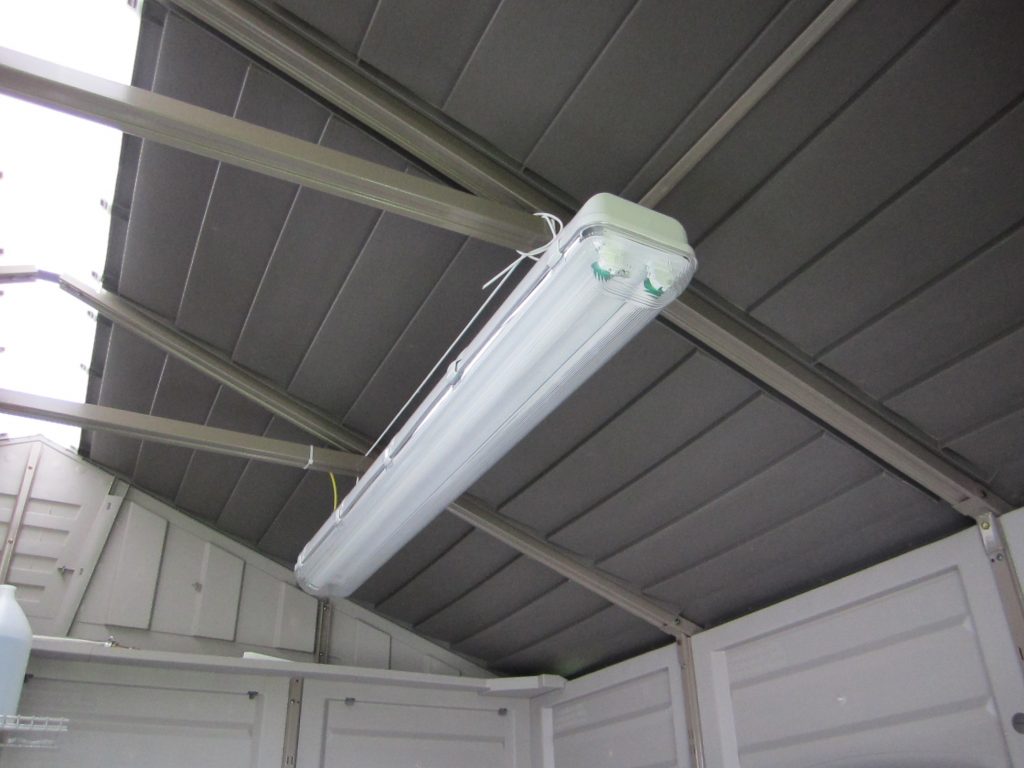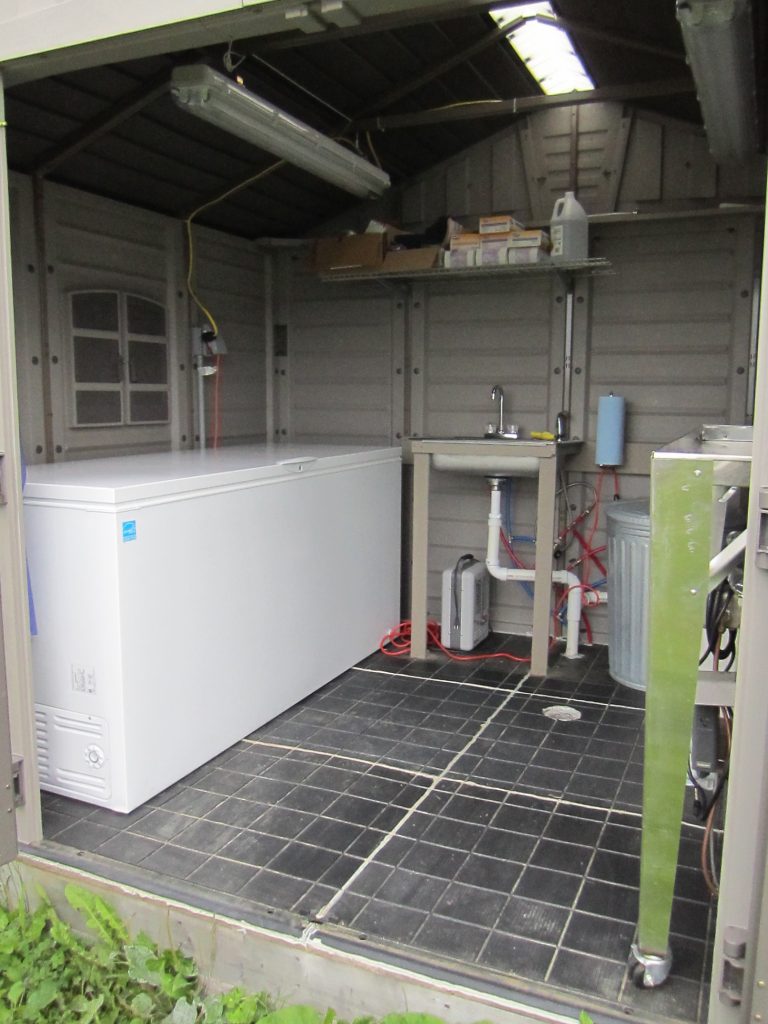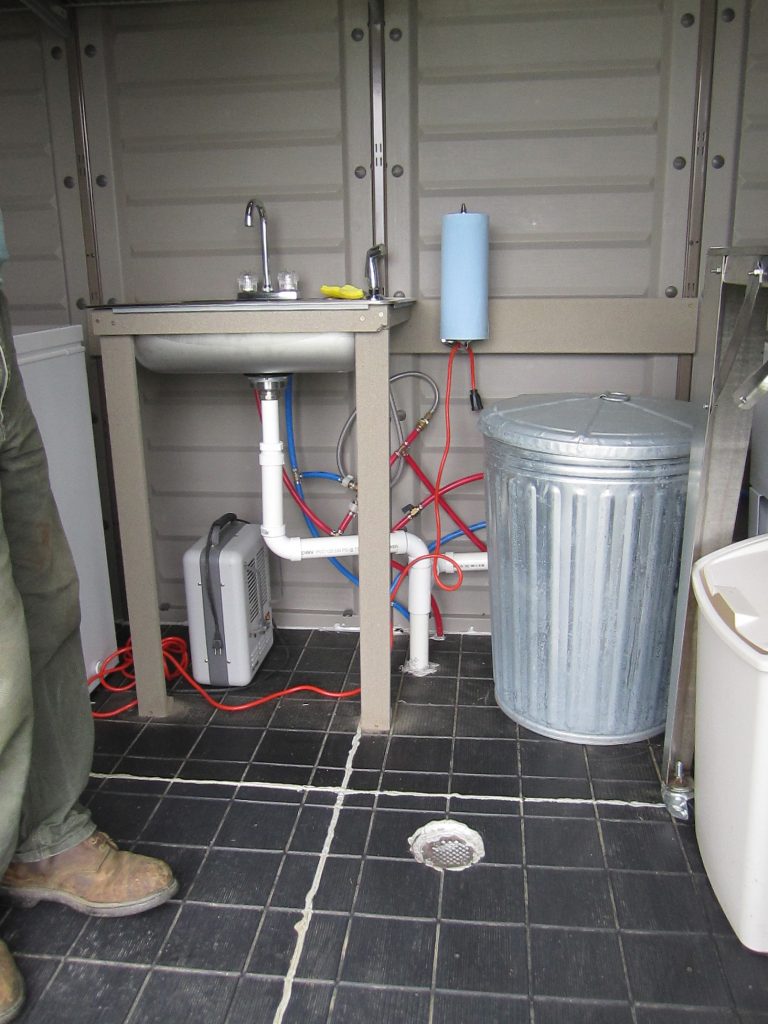Bulletin #2235, Maine Poultry Facts: On-Farm Poultry Processing for Small Flocks in Maine
Developed by Tori Lee Jackson, Extension Educator, University of Maine Cooperative Extension; and Stephanie Gilbert, Farm Viability & Farmland Protection Specialist, Maine Department of Agriculture
Reviewed/edited by Dr. Henrietta Beaufait, Maine Red Meat and Poultry Inspection Program, Maine Department of Agriculture; and Richard Brzozowski, Extension Educator, University of Maine Cooperative Extension
For information about UMaine Extension programs and resources, visit extension.umaine.edu.
Find more of our publications and books at extension.umaine.edu/publications/.
Table of Contents:
- New Regulations for the Maine Meat and Poultry Inspection Program — Overview
- On-Farm Processing for Small Flocks: The Chapter 348 “Under-1,000-bird” Grower/Producer Exemption
- Before Installing Your Facility — First Steps
- Facilities and Equipment Needed (Minimal Requirements)
- Packaging/Labeling
- Storage
- Other Considerations
- Conclusion
- References
Consumer demand for locally produced poultry products has increased in Maine in the past few years. In response to this demand, farmer interest in producing poultry meat has also increased. Small- and medium-sized flock owners interested in marketing poultry meat products in Maine have traditionally faced several challenges that have narrowed the options for marketing products locally. These include
- insufficient numbers of state- or USDA-inspected commercial poultry processors,
- processor locations that are inconvenient to producers, and
- seemingly high per-bird processing fees at these processing facilities.
However, recent changes to Maine state poultry-processing regulations, which went into effect in May 2010, have made on-farm processing more attainable and affordable, especially for producers raising flocks of less than one thousand birds per year.
New Regulations for the Maine Meat and Poultry Inspection Program — Overview
There are now four options for poultry processing in Maine:
- Official state- and USDA-inspected facilities
State-inspected facilities provide services to producers who wish to sell their products to consumers anywhere in Maine. USDA-inspected facilities provide services to producers who wish to sell their products anywhere in the United States. In both cases, there is no restriction on how or where products are marketed. Continuous inspection is required for this option. Continuous inspection requires a federal or state inspector to be on-site to inspect every animal that is processed. - Custom poultry processing establishments
Custom establishments process for producers who raise poultry only for their own consumption, and not for sale. (Birds are marked “NOT FOR SALE.”) - On-farm processing — up to 20,000 birds
The Chapter 343 grower/producer exemption* allows for processing of up to 20,000 birds each year in an on-farm facility that meets very specific and detailed requirements. Whole birds, cut-up birds, and other poultry products may be sold in-state, directly to consumers as well as wholesale, with the proper licenses. - On-farm processing — up to 1,000 birds
The Chapter 348 grower/producer exemption* allows for processing of up to 1,000 birds per year in an on-farm facility that meets relatively minimal facility requirements. This exemption allows only for the sale of whole birds directly to consumers in Maine.
* It is important to note that the Chapter 343 and 348 exemptions both prohibit the processing of birds from other farms, as well as the use of the facility by anyone else to kill and process their own birds.
On-Farm Processing for Small Flocks: The Chapter 348 “Under-1,000-bird” Grower/Producer Exemption
A poultry producer with a flock of up to 1,000 birds who would like to process them on-farm may now apply for a Chapter 348 Grower/Producer Exemption from the Maine Department of Agriculture. This exemption allows producers who wish to sell directly to consumers in Maine to construct an approved facility under the guidance of the Maine Meat and Poultry Inspection Program at the Maine Department of Agriculture’s Division of Quality Assurance and Regulations.
The Chapter 348 Rule (State of Maine Rule Chapters for the Department of Agriculture, Conservation and Forestry)1 is published in the Agriculture, Food, and Rural Resources section of the Code of Maine Rules as 01-001 CMR Chapter 348.
Requirements of the Chapter 348 exemption:
- Production must be limited to 1,000 birds (produced and processed) in one year (12 months).
- Facility requirements must be met (requirements are fairly minimal).
- No matter whether the birds are killed and bled inside or outside, birds must be eviscerated, cooled, and packed in the facility described in Chapter 348 Rule.
- WHOLE BIRDS may be placed in cold storage that is on-farm or off-site.
- ONLY WHOLE BIRDS may be sold; no cut-ups.
- Birds may be sold ONLY directly to customers on-farm, at farmers markets, or through CSA (community-supported agriculture) memberships.
- Birds may NOT be sold to retail stores, restaurants, schools, etc.
- Birds may NOT be sold on the Internet or across state lines.
- The grower/producer must obtain
- a commercial food processing license (2012 cost: $50),
- retail authorization for prepackaged meat and poultry products (2012 cost: $10), and
- a Mobile Vendor license for farmers market sales (2012 cost: $20).
These food license applications are available by visiting Licenses and Permit Forms2 at the Maine Department of Agriculture, Food and Rural Resources, or by calling (207) 287-3841.
Before Installing Your Facility — First Steps
Producers who intend to apply for a Chapter 348 exemption should contact the Maine Meat Inspection Program by calling Henrietta Beaufait at 207.287.7512 or e-mailing henrietta.beaufait@maine.gov, before beginning construction or renovation of any processing facility. An inspector will visit your site, advise you on the specific requirements, and make recommendations on how to best create your facility. After you have completed construction, an inspector will visit your farm again to review your facility and grant your license. Once issued, your license must be clearly displayed so that consumers can see it. Licensed facilities will be reviewed at least annually.
Facilities and Equipment Needed (Minimal Requirements)
The equipment necessary for an on-farm poultry processing facility that qualifies for the Chapter 348 exemption is fairly minimal. Requirements include the following:
- A building with easily cleanable floors, walls, and ceilings
- Adequate sanitation capacity for offal, rubbish, and wastewater
- Adequate lighting (using safety bulbs)
- Screened ventilation
- A sink for hand-washing
- Floor drains
- Sink and floor-drain water disposal via a system with an approved nutrient management plan or an approved alternative disposal plan
- Potable hot and cold water (testing is required twice each year for private wells).3
- Capacity to sanitize all utensils and equipment prior to use (if hot water is used for sanitizing, a temperature of 170°F must be maintained for 30 seconds)
- A separate slaughter and defeathering area, which may be located outside, provided that the blood is collected, or inside, provided that there is adequate separation (such as a wall or curtain) between the slaughter and processing areas
Example of a small-flock on-farm processing facility
One idea for an inexpensive processing facility that could meet the requirements of the Chapter 348 exemption would be to buy a heavy-duty plastic shed kit (less than $700 at average 2012 prices) and install it on a concrete slab. The shed could be equipped—including plumbing, fixtures, lighting, a cooler, shelving, and work tables—for an additional estimated $1,000.




Packaging/Labeling
The packaging of birds must be done with materials that will not transmit objectionable substances or allow contamination of the carcass, such as vacuum-sealed plastic. Labels may include your farm logo, and must include the following information on each individual package:
- Name, address, and zip code of grower/producer
- The common name of the product, for example, “WHOLE FRYER “
- Net weight
- Food processing lot number
- Maine grower/producer license number
- The following statement, clearly displayed: “Exempt under 22 M.R.S. section 2517-C NOT INSPECTED”
- Safe handling instructions for consumers that include the following language:
“Keep refrigerated or frozen. Thaw in refrigerator or microwave. Keep raw poultry separate from other foods. Wash working surfaces, including cutting boards, utensils, and hands after touching raw poultry. Cook thoroughly to an internal temperature of at least 165°F maintained for at least 15 seconds. Keep hot foods hot. Refrigerate leftovers immediately or discard.”
Storage
Poultry carcasses must be cooled immediately, either with potable water and ice made from potable water or by air-chilling in a commercial cooler. Once cooled, the birds should be packaged and placed in cold storage until sold. A refrigerator or freezer may be adjacent to the processing facility or in a private home as long as it is dedicated to this use.
Other Considerations
- Consider conducting a consumer-based market survey to determine local demand for specific whole-bird products before investing in a facility.
- Remember that processing represents a separate business enterprise. You may want to calculate costs to determine the potential profitability of such an enterprise. Be sure to include electricity/storage, equipment, packaging materials, insurance, labor, etc., and calculate a per-bird processing cost. Determine how long it will take to break even on the costs of the facility, in view of the 1,000 bird per year limit.
- Research the entire meat processing procedure for the species you plan to process before designing and installing a facility.
- Be sure that there is an ample water source since water will be essential.
- Consider researching the composting of offal from processing birds. The Maine Compost School’s Articles is a good place to start.4
Conclusion
Because of the insufficient number of processing options in Maine, locally produced poultry products are difficult to find in most areas of the state. On-farm processing can be a valuable tool for small poultry producers who wish to offer poultry products in local markets. By eliminating the transportation and processing costs associated with an off-farm processing facility, per-bird costs can be reduced, resulting in increased profitability.
References
Rule Chapters for the Department of Agriculture, Food and Rural Resources: 01-001 CMR (Code of Maine Rules) Chapter 348: Poultry Slaughter And Processing With Grower/Producer Exemption. (https://www.maine.gov/sos/cec/rules/01/chaps01.htm)
Rule Chapters for the Department of Agriculture, Food and Rural Resources: 01-001 CMR (Code of Maine Rules) Chapter 343: Food Processing and Manufacturing. (https://www.maine.gov/sos/cec/rules/01/chaps01.htm)
Witherbee, Nicole, and Stephanie Gilbert. Poultry Processing Needs in Maine (PDF). PolicyEdge and Maine Department of Agriculture Report. March 2011. (www.maine.gov/tools/whatsnew/attach.php?id=216851&an=1)
1 Available on the State of Maine Rule Chapters for the Department of Agriculture, Conservation and Forestry page, Maine.gov website (https://www.maine.gov/sos/cec/rules/01/chaps01.htm) or by calling the Maine Bureau of Corporations, Elections, and Commissions at 207.624.7736.
2 Available one the Quality Assurance & Regulations page, Maine.gov Department of Agriculture, Conservation and Forestry website (https://www.maine.gov/dacf/qar/index.shtml)
3 Visit the Maine Health and Environmental Testing Laboratory’s water testing page at Order Water and Radon Air Tests Kits Online page, Maine.gov Division of Public Health Systems website (https://www.maine.gov/dhhs/mecdc/public-health-systems/health-and-environmental-testing/standard.htm), or call 207.287.2727.
4Available on the Articles/Maine Compost Team Publications page (http://composting.org/articles/)
Information in this publication is provided purely for educational purposes. No responsibility is assumed for any problems associated with the use of products or services mentioned. No endorsement of products or companies is intended, nor is criticism of unnamed products or companies implied.
© 2012
Call 800.287.0274 (in Maine), or 207.581.3188, for information on publications and program offerings from University of Maine Cooperative Extension, or visit extension.umaine.edu.
The University of Maine System (the System) is an equal opportunity institution committed to fostering a nondiscriminatory environment and complying with all applicable nondiscrimination laws. Consistent with State and Federal law, the System does not discriminate on the basis of race, color, religion, sex, sexual orientation, transgender status, gender, gender identity or expression, ethnicity, national origin, citizenship status, familial status, ancestry, age, disability (physical or mental), genetic information, pregnancy, or veteran or military status in any aspect of its education, programs and activities, and employment. The System provides reasonable accommodations to qualified individuals with disabilities upon request. If you believe you have experienced discrimination or harassment, you are encouraged to contact the System Office of Equal Opportunity and Title IX Services at 5713 Chadbourne Hall, Room 412, Orono, ME 04469-5713, by calling 207.581.1226, or via TTY at 711 (Maine Relay System). For more information about Title IX or to file a complaint, please contact the UMS Title IX Coordinator at www.maine.edu/title-ix/.

